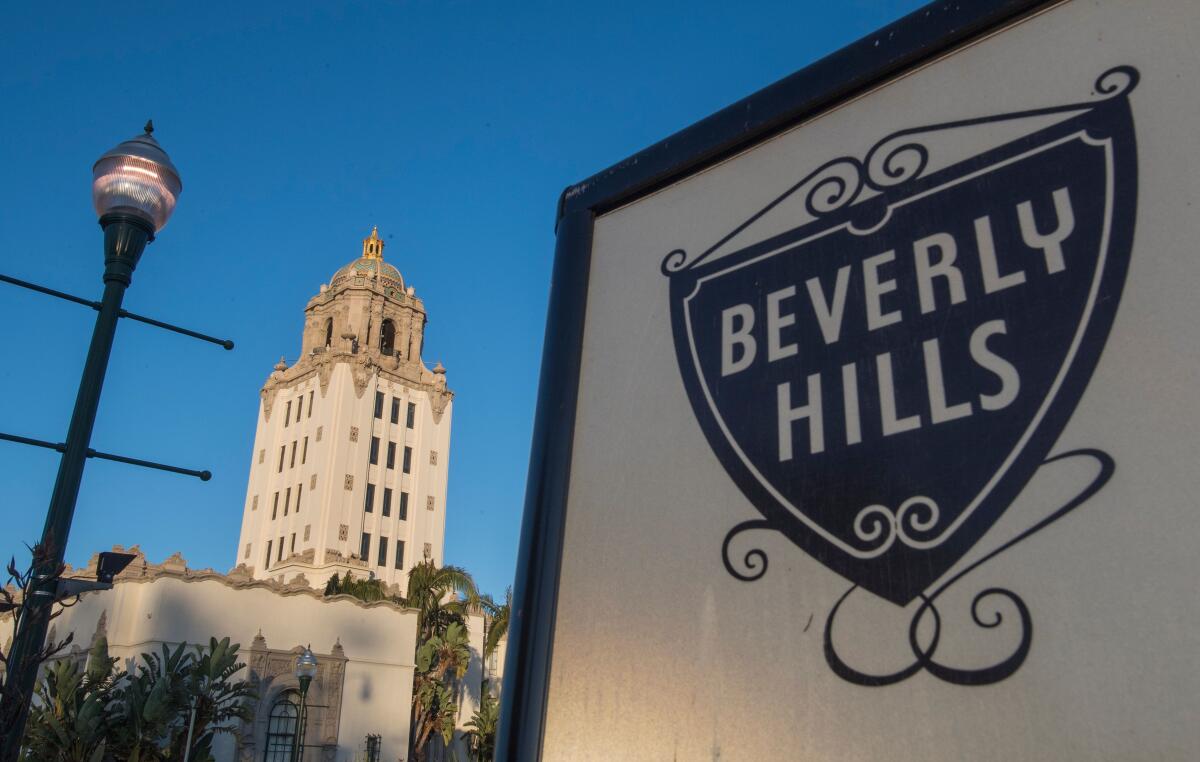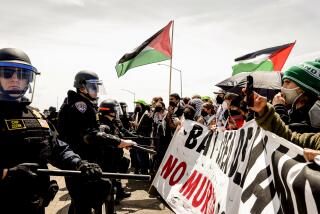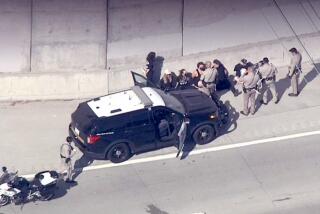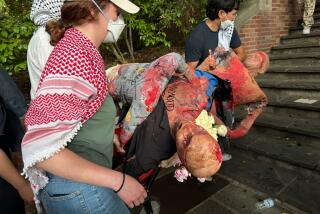Beverly Hills facing criticism after arrests of 28 peaceful protesters

Beverly Hills is facing criticism after officers arrested 28 people during a peaceful protest against police violence overnight, two weeks after imposing an unusual ordinance banning demonstrations in residential areas that “disrupted the tranquility.”
The latest protest, which began about 7:30 p.m. Friday and drew about 75 people, was the third demonstration in Beverly Hills organized by the Black Future Project, but the first that resulted in arrests, said organizer Austin Tharpe, 29.
“We’re protesting for Black lives,” he said. “Specifically in Beverly Hills, because of the privilege and the whole makeup of the community, we felt like our voices needed to be heard over there.”
He said that after protesters marched for several hours, police deployed a long-range acoustic device, also known as a sonic cannon, and declared the demonstration an unlawful assembly shortly before midnight.
“We put the signs on the ground,” he said. “We turned around and faced away from the cops with our knees on the ground and our hands behind our head.”
He said that officers continued to yell out orders to disperse, while protesters continued to kneel.
A total of 28 people were taken into custody, most on suspicion of unlawful assembly, though one person faced an attempted arson charge after allegedly trying to set fire to a large American flag that was attached to a building, said Sgt. Thomas West of the Beverly Hills Police Department. That person was associated with the protest but not the Black Future Project, Tharpe said.
“They were given multiple warnings to leave, and as arrests were being made we were continually asking people to leave, so it was just the people who absolutely refused to leave who were placed under arrest,” West said.
Initially, the Police Department planned to hold the protesters under what’s called a misdemeanor non-release, which would have required that they post $5,000 bail to get out, West said.
Later in the day, citing a directive from command staff, the department reversed course and said the protesters would be cited and released on their own recognizance, provided that they did not have outstanding warrants. The demonstrators remained in custody late Saturday afternoon, prompting concern from activists who said they should have been cited and released more quickly.
That came after the National Lawyers Guild issued a statement decrying the $5,000 bail as “unacceptable” and calling for the protesters to be immediately freed.
“It is outrageous that during a statewide health crisis — and when, as we have been hearing from our local, state, and federal officials, the number of COVID-19 cases in California are continuing to rise — that the Beverly Hills Police Department would hold these peaceful protesters in custody,” the organization said in a statement. “Keeping these men and women in custody will unnecessarily expose them to significant health risk and endanger their lives.”
Many of the protesters still had not been released by 7 p.m. Saturday. West said they were in the process of being physically booked, “and that booking process takes time,” particularly due to the volume of arrests.
“It’s very retaliatory,” Tharpe said. “We’ve had this situation before, and we’re usually detained, given a citation and in and out within two to three hours. It’s extremely aggressive for them to be detained for almost 14 hours and still not processed, still no word from them.”
In a statement Saturday evening, a city spokesman said that the Police Department had “added additional staff to facilitate the process.”
Asked to comment on the arrests and the strong rebuke from the National Lawyers Guild, Beverly Hills Mayor Lester Friedman released a statement saying that protesters were given multiple warnings before being taken into custody.
“Last night’s protest in a residential area,” Friedman said, “was a violation of the City’s Civil Emergency Order.”
The arrests occurred in a residential section of the city north of the glitzy shopping district.
The order, which took effect June 13, states that no more than 10 people are allowed to gather for an assembly in a residential area between the hours of 9 p.m. and 8 a.m. An assembly is defined as a gathering in a public place that consists of 10 or more people who have a common goal.
The order restricting nighttime assemblies cites the events of May 30, as well as an “Occupy” protest that was held Friday from 10 p.m. to 1 a.m.
The protest “included bullhorns and amplified music and disrupted the tranquility of the residential neighborhood during hours when many people would ordinarily be sleeping,” the order states.
The city has deemed it necessary to limit the use of residential neighborhoods at night to allow residents to sleep, according to the order.
Those who violate the order can face arrest and be charged with a misdemeanor.
More to Read
Sign up for Essential California
The most important California stories and recommendations in your inbox every morning.
You may occasionally receive promotional content from the Los Angeles Times.












